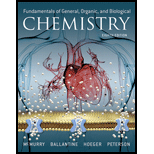
Concept explainers
(a)
Interpretation:
The IUPAC name for the following alkane should be determined.
Concept introduction:
Naming
•Name an alkane by determining the number of carbons in the longest continuous chain.
•Assign a name from the compounds in the alkane series (e.g., butane, pentane, and hexane).
•Add the names of substituents attached to the longest chain, writing the name as a single word.
•Number the carbon at which the substituent is attached. Separate the number from the name by a hyphen. Each substituent must have a number.
•The substituents are usually given in alphabetical order, but assigned the number of the carbon to which the substituent is attached.
•Begin numbering at the end of 1°, the chain closest to the first substituent.
•Because they have some similar properties, it is sometimes convenient to refer to some organic compounds as 1° (primary), 2° (secondary), 3° (tertiary), and 4° (quaternary). A primary alcohol contains an alcohol
(b)
Interpretation:
The IUPAC name for the following alkane should be determined.
Concept introduction:
Naming Alkanes
•Name an alkane by determining the number of carbons in the longest continuous chain.
•Assign a name from the compounds in the alkane series (e.g., butane, pentane, and hexane).
•Add the names of substituents attached to the longest chain, writing the name as a single word.
•Number the carbon at which the substituent is attached. Separate the number from the name by a hyphen. Each substituent must have a number.
•The substituents are usually given in alphabetical order, but assigned the number of the carbon to which the substituent is attached.
•Begin numbering at the end of 1°, the chain closest to the first substituent.
•Because they have some similar properties, it is sometimes convenient to refer to some organic compounds as 1° (primary), 2° (secondary), 3° (tertiary), and 4° (quaternary). A primary alcohol contains an alcohol functional group attached to a carbon that is, in turn, attached to no other carbons. A secondary alcohol contains a hydroxyl group attached to a carbon that is, in turn, attached to only two other carbons.
Want to see the full answer?
Check out a sample textbook solution
Chapter 12 Solutions
Fundamentals of General, Organic, and Biological Chemistry (8th Edition)
- Draw the reaction between sphingosine and arachidonic acid. Draw out the full structures.arrow_forwardDraw both cis and trans oleic acid. Explain why cis-oleic acid has a melting point of 13.4°C and trans-oleic acid has a melting point of 44.5°C.arrow_forwardDraw the full structure of the mixed triacylglycerol formed by the reaction of glycerol and the fatty acids arachidic, lauric and trans-palmitoleic. Draw the line structure.arrow_forward
- Draw out the structure for lycopene and label each isoprene unit. "Where is lycopene found in nature and what health benefits does it provide?arrow_forwardWhat does it mean to be an essential fatty acid? What are the essential fatty acids?arrow_forwardCompare and contrast primary and secondary active transport mechanisms in terms of energy utilisation and efficiency. Provide examples of each and discuss their physiological significance in maintaining ionic balance and nutrient uptake. Rubric Understanding the key concepts (clearly and accurately explains primary and secondary active transport mechanisms, showing a deep understanding of their roles) Energy utilisation analysis ( thoroughly compares energy utilisation in primary and secondary transport with specific and relevant examples Efficiency discussion Use of examples (provides relevant and accurate examples (e.g sodium potassium pump, SGLT1) with clear links to physiological significance. Clarity and structure (presents ideas logically and cohesively with clear organisation and smooth transition between sections)arrow_forward
- 9. Which one of the compounds below is the major organic product obtained from the following reaction sequence, starting with ethyl acetoacetate? 요요. 1. NaOCH2CH3 CH3CH2OH 1. NaOH, H₂O 2. H3O+ 3. A OCH2CH3 2. ethyl acetoacetate ii A 3. H3O+ OH B C D Earrow_forward7. Only one of the following ketones cannot be made via an acetoacetic ester synthesis. Which one is it? Ph کہ A B C D Earrow_forward2. Which one is the major organic product obtained from the following reaction sequence? HO A OH 1. NaOEt, EtOH 1. LiAlH4 EtO OEt 2. H3O+ 2. H3O+ OH B OH OH C -OH HO -OH OH D E .CO₂Etarrow_forward
- what is a protein that contains a b-sheet and how does the secondary structure contributes to the overall function of the protein.arrow_forwarddraw and annotate a b-sheet and lable the hydrogen bonding. what is an example that contains the b-sheet and how the secondary structure contributes to the overall function of your example protein.arrow_forwardFour distinct classes of interactions (inter and intramolecular forces) contribute to a protein's tertiary and quaternary structures. Name the interaction then describe the amino acids that can form this type of interaction. Draw and annotate a diagram of the interaction between two amino acids.arrow_forward
 Principles Of Radiographic Imaging: An Art And A ...Health & NutritionISBN:9781337711067Author:Richard R. Carlton, Arlene M. Adler, Vesna BalacPublisher:Cengage Learning
Principles Of Radiographic Imaging: An Art And A ...Health & NutritionISBN:9781337711067Author:Richard R. Carlton, Arlene M. Adler, Vesna BalacPublisher:Cengage Learning Anatomy & PhysiologyBiologyISBN:9781938168130Author:Kelly A. Young, James A. Wise, Peter DeSaix, Dean H. Kruse, Brandon Poe, Eddie Johnson, Jody E. Johnson, Oksana Korol, J. Gordon Betts, Mark WomblePublisher:OpenStax College
Anatomy & PhysiologyBiologyISBN:9781938168130Author:Kelly A. Young, James A. Wise, Peter DeSaix, Dean H. Kruse, Brandon Poe, Eddie Johnson, Jody E. Johnson, Oksana Korol, J. Gordon Betts, Mark WomblePublisher:OpenStax College Biology 2eBiologyISBN:9781947172517Author:Matthew Douglas, Jung Choi, Mary Ann ClarkPublisher:OpenStax
Biology 2eBiologyISBN:9781947172517Author:Matthew Douglas, Jung Choi, Mary Ann ClarkPublisher:OpenStax





